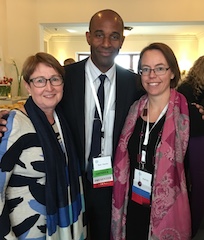Insiders and Outsiders – the pain and the gain
 Panelists Trisha Carter, Ryan Haynes, Marian van Bakel at #FIGT16NL
Panelists Trisha Carter, Ryan Haynes, Marian van Bakel at #FIGT16NL
In 2016, I led a panel at a Conference in Amsterdam. ‘Insiders and Outsiders –Is Belonging Overrated?’.
It was the conference of Families in Global Transition an organisation that speaks to the growth, success and well-being of people crossing cultures globally.
The people who were there were expats, migrants, global nomads. But most of them weren’t the employee who was moved.
They were the partners and the children of those who had been moved around the world by corporations, diplomatic corps, military, missionary, or NGOs. They were the people who fell in love and moved cultures to be with their partner, raising children who represent different cultures, speak multiple languages. They were the people who had returned ‘home’ to find they no longer felt ‘at home’. And they were the educators, the service providers, the researchers and the writers who tell the stories and support these groups on their journeys.
If anyone knew about being on the outside – these conference attendees did.


 Build a Flourishing Life
Build a Flourishing Life